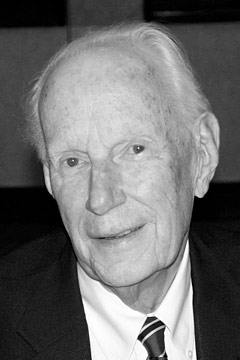Kenneth Stampp, noted historian of the Civil War and slavery, dies
| 15 July 2009
BERKELEY — Kenneth M. Stampp, a University of California, Berkeley, professor emeritus of history and a formidable scholar best known for paving the way to a sharply revised assessment of American slavery, the coming of the American Civil War and Southern Reconstruction, died in Oakland, Calif., on Friday, July 10. He was 96.
Although Stampp's work aroused controversy in some academic quarters, his interpretations prevailed, and he is recognized today as one of the most influential 19th century historians.
 Kenneth Stampp (Jean Working photo)
Kenneth Stampp (Jean Working photo)
His 1956 book "The Peculiar Institution: Slavery in the Ante-Bellum South" remains "the indispensable reinterpretation" of the enslavement of African men and women and has influenced decades of scholarship and teaching, said Leon Litwack, a UC Berkeley professor emeritus of history as well as a former student and colleague of Stampp's.
"In any subsequent study of slavery, the voices of the slaves themselves could no longer be denied," Litwack said, referring to the impact of Stampp's extensive documentation of the daily lives and resistance efforts of slaves. "He humanized enslaved African Americans and read what they said about slavery rather than depend on the recollections of those who had been their masters."
As an example, Litwack pointed to Stampp's final chapter of "The Peculiar Institution," which contains remarks by a slave who said, "Tisn't he who has stood and looked on, that can tell you what slavery is, - 'tis he who has endured. I was black but I had the feelings of a man as well as any man."
Stampp, a native of Milwaukee, Wisc., was born on July 12, 1912. He earned his B.A., M.A. and Ph. D. in history at the University of Wisconsin in Madison in 1935, 1937 and 1942, respectively.
After short teaching stints at the University of Arkansas and the University of Maryland, he became an assistant professor of history at UC Berkeley in 1946. He remained there until his retirement in 1983 as the Alexander F. and May T. Morrison Professor Emeritus.
Over the years, Stampp lectured at scores of colleges and universities in the United States and abroad - as a visiting professor at Harvard University, Colgate University in New York and Williams College in Massachusetts; as a visiting fellow at All Souls College at the University of Oxford in England; and as the Commonwealth Lecturer at the University of London, the Harmsworth professor at Oxford University, and as a Fulbright Lecturer at the University of Munich in Germany.
Stampp's "The Era of Reconstruction, 1865-1877" (1965) rejected the traditional notion of Reconstruction as a period of unredeemed sordidness and misrule, and it forced a reappraisal of the often misunderstood and caricatured era. In "The Imperiled Union" (1980) and "America in 1857: A Nation on the Brink" (1990), Stampp continued his far-reaching exploration of issues relating to slavery and the Civil War.
"Stampp's work was characterized not only by impressive scholarly research and sound judgment, but also by the breadth of his interests, the clarity and rigor of his analysis, a respect for the complexity and integrity of the past, and an elegant style," said Litwack.
"Stampp always cared deeply about how to communicate history, about the need to make that history available not only to historians and students, but to a larger public," Litwack added.
As a survivor of the Great Depression, Stampp developed a keen sense of social justice and was committed to progressive politics, said his attorney, Richard F. Hill. Stampp actively opposed the Loyalty Oath imposed by the University of California system in the early 1950s, even though he said family concerns led him to reluctantly sign the oath. He participated in one of the 1965 Civil Rights marches from Selma to Montgomery, Ala.
Stampp's distinctions include serving as president of the Organization of American Historians (1977-78); election as a fellow of the American Academy of Arts and Sciences (1975) and the American Antiquarian Society (1972); being named a Guggenheim Fellow twice (1952-1953 and in 1968); and receiving the American Historical Association's Award for Scholarly Distinction (1989). His book "The Imperiled Union" won a silver medal in the 60th annual San Francisco Commonwealth Club's annual book awards program. In 1993, Stampp also earned the Lincoln Prize from Gettysburg College's Civil War Institute for his lifetime contributions to Civil War studies.
Family members said Stampp was devoted to the opera, ballet, symphony and theater. He also loved travel, the mountains and walking. In his later years, he visited Switzerland with his wife, Isabel, almost every summer.
Stampp's first marriage ended in divorce and in 1962 married Isabel Peebles Brown, who died in 1996. His survivors include a son, Kenneth Mitchell Stampp Jr. of Oakland; daughters Sara Katherine Stampp of Berkeley, Jennifer Elizabeth Stampp of El Cerrito, Calif., and Michele S. Macartney-Filgate of Toronto; as well as four grandchildren and his partner, Jean Working of Oakland.
In lieu of flowers, contributions may be made to the Isabel B. and Kenneth M. Stampp Fund for the San Francisco Symphony, c/o the San Francisco Symphony, Davies Hall, San Francisco, CA 94102-4585. A campus memorial event will be held in September.

